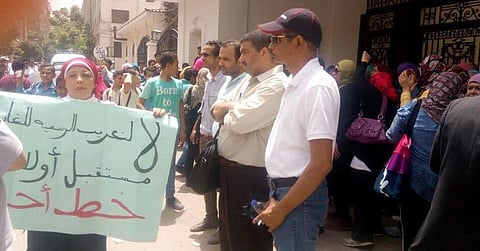Crackdown on private tuition triggers outcry in Egypt
Parents demand good schooling before banning of private lessons

Cairo: For years, walls of buildings in Egypt have been covered with posters touting private tuition centres. Promotional signs audaciously read: “Shakespeare of the English language”; “Pythagoras of mathematics”; and “Einstein of physics!”
Not any more.
Education authorities this month started a nationwide crackdown on private tuition providers, which costs parents about 25 billion Egyptian pounds (Dh5.2 billion) annually, according to official figures.
Authorities have so far shut down dozens of private tuition centres, accusing them of operating illegally and drawing students away from schools.
In a country where government austerity measures have put pressure on most households’ budgets, it is surprising that the vociferous opposition to the clampdown on private tuition outlets comes mainly from parents.
“Private lessons are the result of bad education at school,” said Mahmoud Mohram, a father of three schoolchildren.
“The roots of the problem are crammed schools, complicated curricula, inefficient teachers and an educational system based on rote learning and exams. Change all of this and private lessons will stop to exist,” he added.
Mohram, who works at a travel agency in Cairo, said outside-school tuition costs him about LE1,600 per month.
“As parents, we are not happy with spending our money on private lessons amid our economic problems, but we have no option in this. First, the [Education] ministry should fix its schools before it closes private lesson centres,” he said.
President Abdul Fattah Al Sissi said this month that his country, grappling with economic woes, needs about LE130 billion to build 250,000 well-equipped classrooms in order to downsize the high density to reach 40 pupils per class. Media reports have put current class density in some government-run schools at 80 pupils.
Around 700,000 new pupils are admitted annually into schools in Egypt, the Arab world’s most populous country with about 100 million people.
Education Minister Tarek Shawki has repeatedly promised to reform education.
His plan has provoked controversy in the media and drawn rare street protests from parents. The minister has accused interest groups of trying to hamper his drive.
“All private lesson centres will be closed in two months. There is no going back on this,” an educational official told Gulf News. “These centres have subverted the education process. This must end,” the official added on condition of anonymity because he is not authorised to talk to the media.
This month, the Education Ministry disclosed it was working on a draft law to be presented to parliament making private lessons a crime. Details of the draft, leaked to the media, indicate punishment teachers at these centres by a fine of up to LE50,000 and repeat offenders by up to three years in jail.
The vow has drawn angry criticism from parents online.
“This is not a remedy to the actual disease,” said a woman, named Asmaa Saeed, in a Facebook post.
“We need efficient and conscientious schoolteachers. So that our children will not [have to] resort to private lessons,” she added.
“Let them first fix schools and then shut private tuition centres,” commented another named Walaa Hafez.
“Everyone backs the closure of private tuition centres, but the question is: When?” said Khaled Safwat, the founder of an online parent group. “This would be possible when we have a schoolteacher who explains lessons well inside the classroom; curricula that promote creativity and a system that does not overemphasize exams,” he added. “So far, this is not the case on the ground.”
Safwat believes the current campaign against private lesson outlets is doomed.
“Even if these centres are closed, parents will convert their houses into alternative places for private lessons. Parents turn to private tutors because they offer a service that schools don’t provide.”
An estimated 20.4 million students are registered in different school stages in Egypt, according to recent figures.



